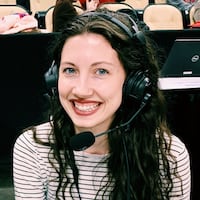The message from the Eastern Band of Cherokee Indians was clear.
“We’re still here.”
Before the Braves’ home opener Wednesday, a 7-4 win vs. the Rays at Truist Park, the team aired a video on Fox Sports Southeast about the Eastern Band of Cherokee Tribe, which Braves CEO and president Derek Schiller visited in Cherokee, N.C., several months ago.
“There’s an entire other subculture known as Indian Country, and that we’ve been here for 10,000 years, and that we’re strong, we’re resilient, and we’re still here,” the Tribe’s principal chief Richard Sneed told reporter Kelly Krull of what he hoped people learned from the video, pointing out there are nearly 600 federally recognized Tribes across the country.
The Braves are one of several sports teams that use the name and likeness of the Native American community, and they previously formed a Native American Working Group to “collaborate with us on cultural issues, education and community outreach to amplify their voices and show our fans they are still proudly here,” the Braves said in a statement. Sneed has been involved in that process, and it appears this is one step in strengthening the relationship the organization has with the community.
The video showed images and messages from different Cherokee people, and focuses on the enduring Cherokee culture, and the ways in which they take pride in and preserve cultural practices.
“We are the Eastern Band of Cherokee Indians,” said Laura Blythe, a program director at Cherokee Historical Association. “What that means is we are the ones who remained here in western North Carolina area after the Trail of Tears. People who stayed behind, who resisted. That’s where we come from. We take a lot of pride in that, being so strong and being able to stay here in our homeland. We also have the duty to make sure that we still practice our culture.”
Bo Lassiah, a curriculum specialist for the Eastern Band of Cherokee Indians, emphasized the importance of retaining the Cherokee’s language: “We hold our language very sacred, maybe because it’s slipping away.”
Regarding the Braves, Sneed told Krull the team has had a relationship with the tribe since 2001, but several months ago Schiller reached out to Sneed wanting to strengthen the relationship and learn more about the community.
“I think what’s most important is that the team and the organization understands how important it is to be respectful of Native communities and to understand our culture and to want to build a relationship that is going to foster an understanding, not only with the team and the organization but with the Atlanta community as a whole,” Sneed said.
The Braves continuing to use the name and likeness of the Native American community is controversial for some, as is the use of the tomahawk-chop cheer. The Washington Redskins are undergoing a name change and will go by the Washington Football Team for the time being, and the Cleveland Indians will meet with Native American people to discuss a potential name change, per ESPN.
Previously, Sneed has said he is not offended by the team’s name, use of Native American imagery or tomahawk cheer, and pointed out that members of the Native American community have differing opinions on this matter.
That includes the opinion of Cherokee Nation’s principal chief, Chuck Hoskin Jr., who earlier in July told the AJC that the Tribe supports the removal of Native mascots from team sports as they misrepresent the culture and “perpetuate stereotypes of American Indians.”
The Braves have said their team name is not changing, and neither are the tomahawks on their uniforms. Schiller recently added discussions about the chop are ongoing, and they will not have a stance on that until fans return to the ballpark (this season, fans cannot attend games in person because of the coronavirus).
About the Author
Keep Reading
The Latest
Featured



